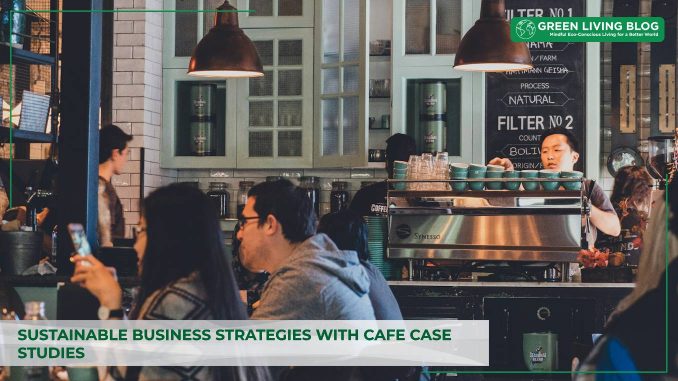
Sustainability is more than just a buzzword; it’s a crucial component of successful business practices. As consumers become increasingly aware of environmental issues, there’s a growing demand for businesses to adopt environmentally conscious practices.
This is especially true in the food and beverage industry, where cafes are uniquely positioned to lead the change. Let’s delve into how sustainability can transform business practices, focusing on cafes as a prime example.
Understanding Sustainability in Business

Sustainability in business refers to the implementation of strategies that meet the needs of the present without compromising the ability of future generations to meet their own needs. This involves a holistic approach, the triple bottom line, which considers economic, environmental, and social impacts.
Adopting sustainable practices offers numerous benefits for businesses. Economically, it can lead to cost savings through increased efficiency and reduced waste. Environmentally, it helps preserve natural resources and reduce pollution. Socially, it enhances brand reputation and fosters a positive relationship with the community. For businesses, sustainability is not just an ethical choice but a strategic one that ensures long-term viability and resilience.
One key aspect of sustainability is understanding its broader implications. Businesses need to look beyond short-term gains and consider the long-term impacts of their operations. This means evaluating how practices affect not just the bottom line but also the environment and society at large. Companies that embrace this comprehensive view are better positioned to navigate the challenges of the modern world and to capitalise on opportunities that arise from sustainable innovation.
Sustainable Practices in Cafes
Cafes are uniquely positioned to innovate and implement sustainable practices. By making conscious choices in sourcing, energy use, waste management, and community engagement, cafes can significantly reduce their environmental footprint and set an example for others.
One primary area where cafes can make a difference is in the sourcing of ingredients. Opting for fair trade, organic, and directly traded products ensures that farmers are paid fairly and that farming practices are environmentally sustainable.
Supporting local suppliers and using seasonal produce can further reduce transportation emissions and boost the local economy. By carefully selecting suppliers and ingredients, cafes can offer products that are not only delicious but also ethically and sustainably produced.
Sustainable sourcing involves not only the products but also the broader supply chain. This includes considering the environmental impact of packaging, transportation, and production methods. Cafes that commit to transparency in their supply chain practices can build trust with their customers, who are increasingly interested in the origins of the products they consume.
1. Energy Efficiency and Conservation: Powering a Greener Cafe

Improving energy efficiency is another critical aspect of running a sustainable cafe. Investing in energy-efficient appliances like commercial coffee machines can significantly reduce electricity consumption. Switching to LED lighting and incorporating renewable energy sources like solar power can further decrease a cafe’s carbon footprint.
The financial benefits of these measures are substantial. Lower energy consumption translates into reduced utility bills, offering immediate cost savings. Over time, the initial investment in energy-efficient equipment pays off, both economically and environmentally. By adopting these strategies, cafes can operate sustainably while enjoying financial savings.
Energy conservation also involves simple day-to-day practices, such as turning off equipment when not in use, maintaining appliances to ensure they run efficiently, and using programmable thermostats to optimise heating and cooling. These small changes can make a big difference in a cafe’s energy consumption.
2. Waste Reduction and Recycling
Waste management is a significant challenge in the food and beverage industry, but it also presents an opportunity for impactful sustainability initiatives. Reducing food waste through practices such as portion control and composting saves money and helps reduce landfill use. Programs that donate surplus food to local charities can make a substantial difference in the community.
Recycling is another essential practice for cafes. Implementing recycling initiatives for paper, plastic, and glass helps minimise waste. Educating staff and customers about proper recycling practices ensures these efforts are effective. By prioritising waste reduction and recycling, cafes can significantly lessen their environmental impact.
Furthermore, cafes can explore using biodegradable or reusable packaging to reduce waste further. For instance, offering discounts to customers who bring their cups or containers can encourage sustainable habits. These initiatives reduce waste and enhance the cafe’s reputation as a forward-thinking and responsible business.
3. Community Engagement and Social Responsibility

Cafes are often more than just places to grab a coffee; they serve as community hubs. Engaging with the local community and taking on social responsibility initiatives can amplify a cafe’s impact. Charitable partnerships, volunteer programs, and educational outreach events benefit the community and build strong customer relationships.
Cafe hosting events promoting dialogue and activism around environmental and social issues can foster a sense of community and shared purpose. This engagement not only enhances the cafe’s reputation but also creates a loyal customer base that values its commitment to sustainability and social responsibility.
Additionally, cafes can support local artists, musicians, and creators by providing a platform for them to showcase their work. This enriches the community’s cultural life and aligns with broader sustainability goals by promoting local talent and reducing the carbon footprint associated with transporting goods and services from afar.
Conclusion
For cafe owners and entrepreneurs, prioritising sustainability is a powerful way to drive innovation, achieve cost savings, and build customer loyalty. By implementing sustainable practices in sourcing, energy use, waste management, and community engagement, cafes can significantly reduce their environmental impact and lead by example.
Sustainability is not just good for the planet; it’s also good for business. As consumers demand more environmentally conscious options, cafes that embrace sustainability will thrive. By making sustainability a core value, cafes can remain relevant, resilient, and respected in the eyes of their customers and communities. Embracing sustainability means paving the way for a future where businesses and the environment can thrive together, fostering a healthier, more equitable world for everyone.
![]()
Author Profile

- Eco Warrior by day, Eco Blogger by night trying to get the eco balance right.
Latest entries
 Green Home GuidesApril 17, 2025How Heat Pumps Help Cut Household Carbon Emissions
Green Home GuidesApril 17, 2025How Heat Pumps Help Cut Household Carbon Emissions EnvironmentApril 17, 20256 Benefits of Wall Cladding for Eco-Friendly Renovations
EnvironmentApril 17, 20256 Benefits of Wall Cladding for Eco-Friendly Renovations EnvironmentMarch 31, 20255 Sustainable Materials for Building Your Dream Eco-Friendly Pergola
EnvironmentMarch 31, 20255 Sustainable Materials for Building Your Dream Eco-Friendly Pergola Best practicesMarch 25, 202510 Green Tips to Live a More Sustainable Lifestyle
Best practicesMarch 25, 202510 Green Tips to Live a More Sustainable Lifestyle





Leave a Reply
You must be logged in to post a comment.